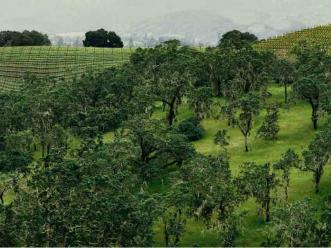Wine is a very particular, complex creature. It has many moods and many incarnations. You can taste the same wine at a vineyard in the summer or on a different continent in winter and the flavor, aroma, and body of the wine will change so drastically, it really isn’t the same wine at all. That being said, a great wine will always be great and a poor wine will always be poor, I’m speaking about how we experience wine can vary with our surroundings.
I was born and bred in California and raised on, primarily, Californian wines. Then, about nine months ago, I moved to Bern, Switzerland. Living in a country that is situated directly in between France and Italy, I’ve been expanding my palate quite drastically. The Californian wines available here are mass-marketed wines of inferior quality for more than double the price. I was in the shops yesterday to match a wine to the baked rosemary chicken dinner I was planning and saw a bottle of 2005 Fetzer cabernet for about twenty dollars. Obviously, I’m not going to be getting nostalgic with anything from the Napa valley anytime soon. Whatever is a guy to do?
Try as many European wines as possible of course! Some wines are familiar; sitting forlorn the shelves of Californian merchants, dusty with import tax prices, pleading to be drunk under Californian skies. However, in their native continent, these familiar labels are arrogant, leaping from the wooden shelving and demanding precedence in my wine cellar. And so, eager to make a good impression in my new home, I take these familiar labels and re-introduce them to my Californian palate.
And here, in Europe, these wines taste different. With the local food, atmosphere, and culture, these wines take on entirely new aspects. It’s all very well and good to have a thick, rich cabernet in California to go with our strongly spiced meals. However, if you are going to spend three hours on a lightly spiced meal in Italy, you are far better off to drink a lighter, fruitier Ripasso. The European wines are meant to be drunk differently than their Californian counterparts. This may seem like an obvious statement, but it takes a while to grasp and then to branch out from the familiar labels and go seeking the hidden treasures that are lying in those French oak winery shelves that will complement not only a meal, but this new environment in which I find myself.
So, this is my mission to all of you; bring you news of European wines and try to present the ideas and cultural experiences that created these wines. Explain how last week’s slightly vinegary Beaujolais is turned into tonight’s salad dressing which complements the Italian Ripasso and rosemary chicken and foie gras. It’s not just enough to taste good wines and bring back reviews. Wine is a creature made of culture, of soil and weather, of nations and continents and should be tasted with these things in mind.





